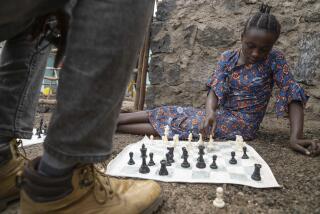In Gang Turf, a Peaceful Exchange of Shots
- Share via
The athletes went head to head on the asphalt court, blocking and shooting against one another as supporters cheered from the bleachers and friends beamed with pride. It made little difference that the South Los Angeles competitors were rival gang members as they traded baskets.
That was the scene Friday at an “Increase the Peace” basketball game sponsored by the Central Recovery Development Program, a South Los Angeles gang intervention agency contracted by L.A. Bridges, the city’s anti-gang initiative.
The goal was simple: Encourage youths from rival neighborhoods to come together in a sporting environment where gang affiliations dissolve and they get to know one another.
“Some of these guys just got out of juvenile camp and are just trying to stay out of trouble,” said gang counselor Luther Keith. “We’re just trying to spread peace throughout the community.”
Friday’s game was played at Duke Ellington High, a continuation school for at-risk youths. The next game in the group’s peace efforts will be Friday at 1 p.m. at the Tri-Community Education Center in Compton.
The games are an outgrowth of the midnight basketball sessions the program has sponsored for more than a decade in communities divided by gang warfare and arbitrary boundaries.
“By putting people from different neighborhoods together, we saw the difference it made in guys making friends and not enemies of one another,” said Leon Gullette Jr. “We figured the same thing could easily work with young people.”
They started planning games for younger players, ages 13 to 19, more than a year ago, forming teams consisting of the youths they work with on the streets.
But counselors also work with youths attending continuation schools in the Los Angeles Unified School District and noticed that they shared a love of basketball. They encouraged school principals with interested students to form teams to compete against their street youths.
It has been a success. There was no talk Friday of Bloods or Crips, no mention of the infamous colors red and blue. Indeed the only rivalry was between the Green Machine and the Duke Ellington Hawks, clad in green and black, respectively.
In the end, the Machine rolled right over the Hawks to an 82-56 victory. Hawks player Marcus Harris, a 17-year-old Duke Ellington student, knew just where his team’s offense fell apart.
“It was the free throws,” he said, sweat dripping down his face. “We just weren’t hitting them.” But the loss, he said, is no big deal. “We ain’t worrying about what [gang] sets [people are from]; everything be cool. Even when it’s over, we ain’t really tripping on it.”
With 32 points and 10 rebounds, Green Machine MVP Billy Sewell put it this way: “This program makes sure that we don’t get shot.”
Sewell, 18, knows how little things can escalate into violence. Three years ago, he was at his grandmother’s house in South-Central when gang members harassed his brother for wearing what Sewell called the “wrong color shoes.”
Sewell said he was often at the “wrong place at the wrong time,” getting caught up in activities that he knew were wrong. But all that is behind him now. He credits Keith for helping him raise his grade-point average from 1.9 to 3.2 and for preparing him for college. “I haven’t seen my dad since I was 8,” said the aspiring computer technology specialist. “[Keith] has been like a father.”
The program also assists with job training and placement.
“A lot of these guys grew up together,” said Duke Ellington Principal Cecil E. McLinn. “The games remind them of the love they have for each other.”
More to Read
Go beyond the scoreboard
Get the latest on L.A.'s teams in the daily Sports Report newsletter.
You may occasionally receive promotional content from the Los Angeles Times.










